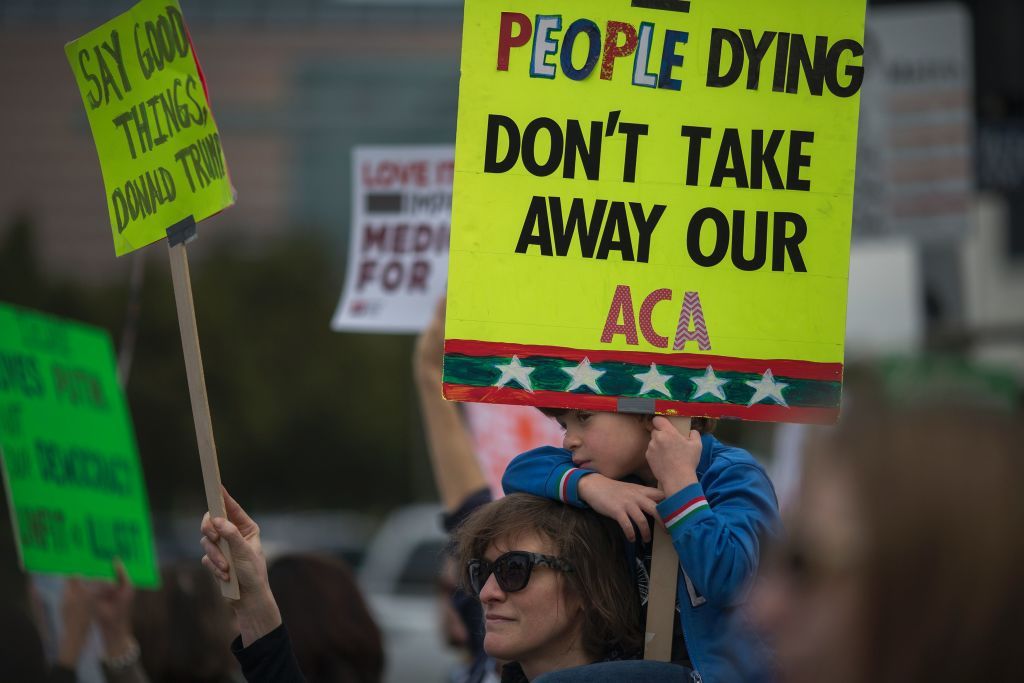
People protest Trump administration policies that threaten the Affordable Care Act, Medicare and Medicaid near the Wilshire Federal Building on Jan. 25, 2017 in Los Angeles. (Photo by David McNew/AFP/Getty Images)
This Q&A is part of Sarah Jaffe’s series Interviews for Resistance, in which she speaks with organizers, troublemakers and thinkers who are doing the hard work of fighting back against America’s corporate and political powers. This week Sarah talks with Angel Padilla, policy director at Indivisible.
Sarah Jaffe: This week the Republicans are trying to ruin all of our lives by gutting the Affordable Care Act. You have a guide out on action for this week. Can you tell us a little bit about it?
Angel Padilla: The next three weeks are the key for stopping this terrible health care bill from getting through the Senate. We put out a guide for our groups instructing them and suggesting tactics that they can use to stop the bill. We really do think that the Senate is the last line of defense here and if it gets through the Senate then there is little hope of stopping it.
SJ: We will obviously link to your guide itself, but what are some of the tactics you are recommending?
AP: We are at a point now where we really just can’t hold back. In this guide, we have suggestions like letters to the editor and non-stop calls. We need to be calling every day to make sure that Senate offices are hearing about this bill and about how people don’t want it. We are also for the first time asking that people consider doing sit-ins. We have instructions for how to hold a sit-in and we feel that this is one of those moments when we really have to do everything we can. Sit-ins make it clear to senators that we are not okay with them trying to take away people’s health care.
SJ: Reports today came out that they are not even going to release anything right now, which obviously seems like a deliberate strategy to keep people from getting fired up about it. Do you think that is working? Is that, in itself — a refusal to release it — getting people more angry?
AP: There are plenty of reasons to be angry about this bill. If they release it, then we all see exactly how bad it is. When we are talking about health care, which is a sixth of the US economy, when we are talking about millions of people who might lose their coverage, the fact that they don’t want to release it is a terrible thing. This is why we are asking that there not be any kind of senate activity until we get public hearings. Democrats should slow this down as much as they can. Again, the American public deserves a transparent process. They deserve to hear and to know how this bill will affect them.
SJ: To be clear, you are recommending that people call Democratic senators as well as Republican senators and insist they do something about this?
— Angel Padilla
AP: Yes. As we have all seen, when constituents go down to town halls and get in front of their member they tell them about how passionately they don’t want to see this bill become law. That is the same kind of passion that we want from Democrats. It is not enough to say that you will vote against the Trumpcare bill. It is not enough to say that you oppose it. You need to do more. They do have certain tools available to them that they are not using. We don’t think that is acceptable, not when people’s lives are on the line.
SJ: During the last Senate recess, there were I believe no town halls held by senators?
AP: Yes. Republican senators are hiding from their constituencies. They are afraid of facing them because they know they are pushing this bad bill that is going to harm them. It is a bill that is literally going to harm thousands and thousands of their own constituents and they are doing it simply because they want to give Donald Trump a win. That is why they are hiding. That is why we have to bring the fight to them.
They are hiding, but constituents can go down to regional offices and they can make their voices heard. They can have sit-ins. They can keep calling. Even if they are not willing to meet with their constituents, they are paying attention. They know that people don’t want it. The only way we are going to stop this bill is if they really get the sense of how widely opposed this bill is. That is the truth.
SJ: The news cycle in the past few weeks has been packed with stories coming out of this administration — even though they have not been able to succeed in passing much or doing much. Has it been hard, with the Comey mania and now with the testimony by Attorney General Jeff Sessions to get people to focus back on this?
AP: Yes. It was a problem for us, too. We changed our position. We had been calling for an independent commission to go along with the independent counsel. Now we are pushing for impeachment hearings because we think that Donald Trump has done enough, has committed enough of a violation, that it warrants impeachment hearings. We are there. I think a lot of our groups were already there weeks ago.
But now, now that is a process that will play out over the course of months and maybe even longer than a year. For now, the thing that is most important is defending the ACA and even though Sessions is testifying, the only thing people should be talking about right now is ACA. That is the thing that matters.
SJ: Certainly, Mike Pence would happily sign ACA repeal.
AP: Yes, definitely.
SJ: And certainly, Paul Ryan would if we get that far down the chain.
AP: This is the moment. This is a do-or-die moment. In January when Trump took office, a lot of groups thought that the House was going to easily pass the bill and the fight was really going to be in the Senate. Luckily, because of all the constituents that came out, we slowed it down in the House and we almost won. We almost killed it four times in the House. It had to get pulled or delayed a number of times. But now, we are where we thought we would be, which is in the Senate. This is where we need to stop it and if we can’t stop it here in the Senate then it is going to be really hard to stop it at all.
SJ: We were talking about the need to call everybody, but are there particular targets or particular Republican votes that you think you can flip on this?
AP: Yes. We actually just created a new website. It is called TrumpcareTen.org where we have the 10 states that matter the most. To be clear, I think the most important message that Republicans need to see and hear is that there is widespread national opposition to this bill. It doesn’t matter if you are in California or if you are in Alabama. You should be out there telling your senators that you do not want this bill.
But we do have the 10 states where we really do think that we can apply a little bit more pressure. I think the biggest ones are Alaska, West Virginia, and Maine. We also have Nevada, Arizona, Colorado, Ohio and Pennsylvania. All of these places are important in this fight and they are going to make the difference.
SJ: Indivisible has been around now for a while. Tell us how it is going. Are people still forming new groups? Where are things?
AP: Every day we have another few groups that join. We are over 6,000 groups. It is actually our six-month anniversary this Wednesday. Groups are still mobilized. People are still activated. Now we have a few more staff people that we can use to provide more resources. The excitement is still there. I think with all of these groups, the main thing on their mind is still ACA. That is what gets them out to town halls, and that is what they are focused on now.
SJ: How do people keep up with you and find their local Indivisible group?
AP: If they go to IndivisbleGuide.com, we have a directory where people can type in their ZIP code and find their local group. We know that there is a local group near them because there are at least two in every congressional district and an average of 13 in every congressional district.
If for any reason there isn’t a group nearby, if there is some issue, you can always start your own.
Interviews for Resistance is a project of Sarah Jaffe, with assistance from Laura Feuillebois and support from the Nation Institute. It is also available as a podcast on iTunes. Not to be reprinted without permission.




